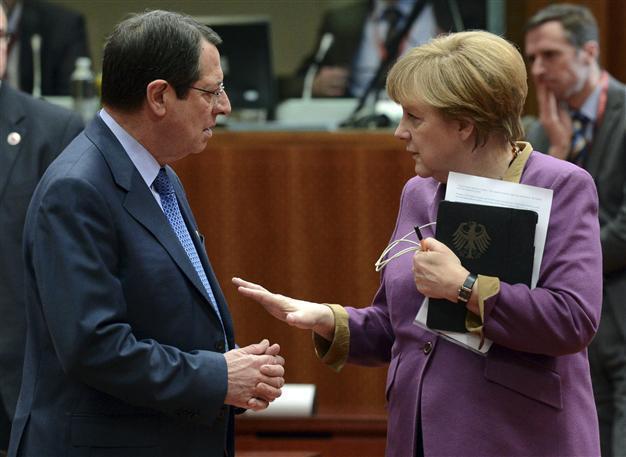Eurozone approves problematic Greek Cyprus bailout
DUBLIN - Agence France-Presse

Cyprus' President Nicos Anastasiades and Germany's Chancellor Angela Merkel (R) speak at a European Union (EU) leaders summit in Brussels March 15, 2013. REUTERS Photo
Eurozone finance ministers formally approved Friday the terms of a problematic Greek Cyprus debt rescue that will cost Nicosia much more than first thought after confusion over the terms.Reviewing the eurozone's fortunes after the Greek Cyprus crisis suddenly raised fresh questions over the future of the single currency, the 17 finance ministers also said however that bailed-out Ireland and Portugal were making progress and would likely win more time to repay their debt.
Dutch Finance Minister Jeroen Dijsselbloem, head of the Eurogroup, said ministers welcomed as "fully in line" a March 25 rescue accord between Greek Cyprus and its international creditors -- the International Monetary Fund, European Commission and European Central bank.
Earlier Friday, it had appeared that Greek Cyprus wanted additional aid after leaked documents indicated a sharp increase in the overall bailout cost to 23 billion euros from the 17 billion euros agreed last month.
But the European Union's Economic Affairs Commissioner Olli Rehn said the lower figure was net and the higher, gross -- with "additional financial buffers ... to allow for unexpected fiscal developments and banking sector needs." "People have been comparing apples with pears and coming up with oranges," Rehn told a press conference following the agreement.
Rehn said that regular EU structural funds, used to boost the economy and planned seven years at a time, could be brought forward and re-directed to help Greek Cyprus.
He warned that accurately forecasting the depth of the recession underway in Greek Cyprus was impossible, saying the economy could shrink up to 15 percent this year alone.
Under last month's bailout accord, Greek Cyprus was to cough up 7.0 billion euros and its creditors, known as the Troika, 10 billion euros.
There was considerable confusion when the 23 billion euros figure came to light and Nicosia asked for more aid earlier this week, prompting speculation the deal would need to be amended.
A Eurogroup statement said the approved bailout "is fully in line with the parameters and key objectives" agreed with Nicosia last month.
The first aid payment should thus be possible in May, it added.
The eurozone finance ministers are joined later Friday by their 10 non-euro counterparts for more talks through to Saturday.
The afternoon meeting is expected to approve giving bailed-out Ireland and Portugal an extra seven years to repay the aid they received to save them from collapse.
Dijsselbloem said ministers wanted "to make a definitive and positive" decision on the extension, designed to ease the pressure on both countries.
The extension is crucial for Portugal, the recipient of a 78-billion-euro ($102-billion) bailout in 2011, after the country's Constitutional Court last week ruled that several measures in the 2013 budget were unlawful.
That ruling will make it difficult for the government to reduce the public deficit to 5.5 percent of gross domestic product (GDP), which it pledged to do to remain eligible for funds under its EU-IMF bailout.
Finance Minister Vitor Gaspar is trying to identify new cuts to plug the resulting 1.3-billion-euro gap.
Both Ireland and Portugal had been pushing for the extension on the grounds that they had stuck closely o the terms of their bailout programmes and had made most progress in being able to return to the financial markets to raise funds conventionally.
The Greek Cyprus bailout is proving a milestone in the eurozone crisis, with small bank depositors, who had thought themselves protected by an EU guarantee, at one point being asked to cough up some of their savings to help fund the rescue.
The move sparked an uproar, forcing officials to beat a retreat and spare those with less than 100,000 euros in deposits.
Those with deposits above 100,000 euros will now pay even more, with the restructuring of the banking sector estimated to ultimately yield up to 10.6 billion euros.
Tax hikes and a sale of gold reserves -- expected to bring in 400 million euros -- are meant to cover the remainder.
















